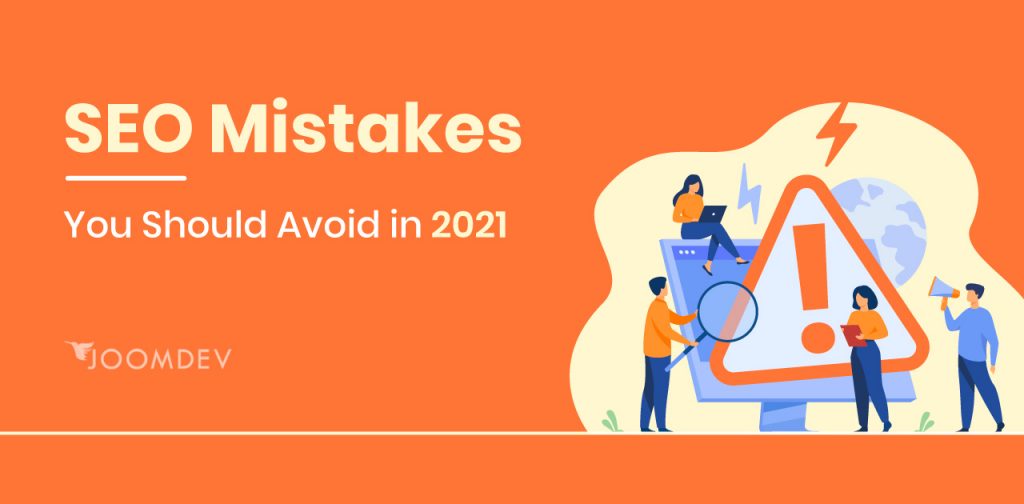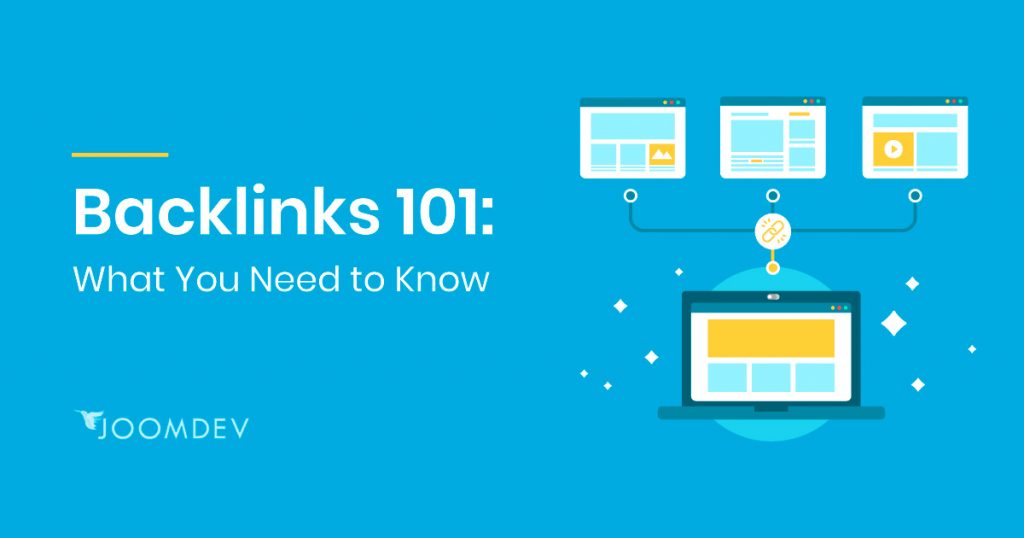Search Engine Optimization (SEO) plays a crucial role in increasing a business’s online presence. But did you know that besides increasing traffic, ranking high on search engine result pages (SERPs) can boost your conversion?
So why are you not seeing these results on your website?
You may have overlooked some key factors that influence your ranking. In terms of SEO malpractice, the list could go on and on. Sometimes your business goals are incoherent with your SEO strategy. At other times, your content isn’t pushing visitors to convert. And there are even more essential components you need to consider in between.
Consider these common mistakes to avoid and best practices to implement in your SEO strategy this year.
SEO Mistakes You Should Avoid
Common Mistakes You Need To Avoid
Forgetting To Set Clear SEO Goals
Before implementing an SEO strategy, determine your SEO goals first. Do you want to increase organic traffic, strengthen domain authority, convert more organic traffic, or reduce bounce rate?
These are important considerations because, without a clear goal, you may find yourself looking at vain results that do not precisely match your business goal.
Failing To Run Site Audits
Conducting website audits allows you to review your website’s performance from the perspective of the user and search engine. If you fail to conduct regular audits, you may not realize critical aspects that affect your website ranking. Some of these factors include navigation, information accessibility, website speed, and your content’s readability.
Failing To Consider Search Intent
Search intent or user intent is a term that refers to the reasoning behind a person’s search query.
Say, one person types in ‘SEO’ on Google, and the other one searches for ‘SEO Jacksonville.’ Though both queries relate to SEO, each person will get a different result based on what Google thinks they’re looking for. ‘SEO’ is more likely to provide more information about what it is, while ‘SEO Jacksonville’ may recommend agencies that offer SEO services in Jacksonville.
Many businesses produce content without even considering what their users are looking for. Identifying user intent must be an integral part of your content strategy. Knowing what your users are looking for can help you build content that adds value to your audience, increasing your site authority in the long term.
Ignoring Mobile Traffic
If your website isn’t mobile-friendly, you’re missing out on a considerable amount of traffic. Nowadays, people are glued to their mobile devices almost 24/7.
Who isn’t? You can pretty much do everything on your phone. No wonder why mobile traffic is slowly creeping up on desktop traffic!
Also, check – Impacts of a Slow Website on Your Business
Include mobile search in your SEO strategy. Doing so will allow you to increase traffic in your website and capture two ends of the spectrum: desktop and mobile traffic.
Sticking To Old Practices
Google’s search algorithm changes frequently. And if you don’t catch up to these updates, your website may suffer.
Most businesses fail to rank because they’re stuck following outdated SEO practices, which include:
- Keyword Stuffing
- Article Spinning
- Buying Links
- Using Private Blog Networks (PBN)
These are just a few examples of old practices that grant your website penalties instead of higher rankings.
Buying Non-Authoritative Backlinks
Simply speaking, backlinks are like citations you use when writing an essay.
How does it work?
Say you own a blog with helpful resources. Every time another website links or cites your blog, you are earning backlinks.
Backlinks are important in SEO because they could make or break your ranking on SERPs. They help search engines evaluate your website, whether it’s authoritative or not.
A high authority website linking to your blog boosts your website’s legitimacy, making it more attractive for search engine bots. The more backlinks you have, the better chances you’ll rank on Google’s top spot.
On the other hand, links from spammy, low authority websites may put you at risk of receiving a penalty. This is why buying backlinks is a huge no-no for Google’s webmasters.
Not Using Data And Analytics

Ranking on top of Google’s SERP isn’t enough. In fact, being number one does not guarantee an increase in conversion. And you certainly need those sales to stay in business.
This is what most businesses fail to realize: SEO offers more than just boosting your traffic. Done the right way, SEO can help take your website conversion to the next level.
Producing Low-Quality Content
Whether you admit it or not, the content remains superior today. If your website does not have a blog or any platform where your visitors can interact, you are missing out on a variety of benefits.
Producing content that provides value to your audience is one of the best ways to rank on SERPs. Having a blog increases your visibility, as well as authority.
On the other hand, giving your audience content that’s spammy or out of human touch affects your rankings and your brand and authority in that niche.
Building Content For Algorithms
Speaking of out-of-human-touch content. Another recipe for SEO disaster is prioritizing how to pass search engine algorithms instead of people’s understanding.
It’s easy to get caught up in crafting content for web crawlers to approve because you want to rank high on SERPs. But, in reality, your content piece’s readability should be on top of mind rather than Google’s algorithm.
Who’s going to read an article that does not sound like a human being, right?
SEO Is Not A Short-Term Solution
A common misconception about SEO is that people treat it as a magic pill you swallow once and expect to see miraculous results.
First of all, magic, cure-all pills do not exist.
Secondly, never expect speedy, miraculous results from implementing SEO strategies.
SEO is a long-term marketing solution that can help increase web traffic, strengthen authority, and boost conversion. Understand that it will take time to rank on Google’s first page.
Best Practices You Need To Follow in 2021
After learning about the common mistakes, let’s take a look at how they can be corrected. These are some of the best practices you should be exploring to achieve your goals.
Center SEO Strategies On Your Goals
As a rule of thumb, start your SEO strategy by identifying goals first. Beginning your SEO journey with the end in mind can help center your focus and efforts in doing only those that could help you achieve your goals.
Schedule A Regular Site Audit
Whether you’re doing it yourself or hiring an SEO specialist, audit your website religiously. If you have an in-house SEO specialist, work closely with them to understand the data you’ll gather from an audit. Regular site audits can help you develop different strategies to improve your website, content, and overall SEO performance.
Get Into Their Minds
Though it may sound a bit creepy, getting into the minds of your target audience allows your business to answer real questions from genuine people.
Also, familiarize yourself with the four types of user intent:
- Informational
- Navigational
- Commercial
- Transactional
Build A Mobile-Friendly Website
A responsive and mobile-friendly website means that it’s fast-loading, easy to navigate, attractive, and interactive. Pay attention to the load speed of your website. Ensure your site loads in under three seconds as this is an important ranking factor and helps decrease bounce rate.
Stay Up-To-Date With SEO Trends
Learning SEO is a continuous process; therefore, you need to be adaptable to constant changes. To help keep your website ranking on SERPs, make sure to keep yourself updated with Google algorithm updates and SEO trends.
Getting yourself up to speed can help you implement changes to your SEO strategy right away. Websites like Search Engine Journal, Moz, Ahrefs, and many more, provide regular updates and resources to help you in your SEO journey.
Earn Your Backlinks
As you learn the ropes of SEO, you’ll realize that it takes time to build a website that will rank high on Google. The best way to get enough backlinks and build authority is to craft value-adding content. As much as possible, acquire superior links from authoritative websites within your niche.
Track Keyword Phrases That Show Results
There is strength in numbers. To increase conversion, use analytics to track which keywords are producing more results. Start targeting long-tail keywords instead of generic keywords. Long-tail keywords may have lower search volume, but it’s specific enough to help you get first page rankings.
Give Your Audience What They Need Regularly
Produce high-quality content regularly. This means crafting content that’s value-adding. At the very least, produce a minimum of four content each week, whether an article, video, or audio format.
Consider creating evergreen content as well. These are timeless content that will be relevant regardless of time and changes in trends.
Speak To Your Audience
Aside from providing value, your content should be personable, engaging, and entertaining for it to rank on search engines. People use search engines because they are looking for answers. If you’re able to give them that in a nice, friendly way, they’re more likely to revisit your website the next time they need a new set of information.
Consistency And Adaptability
To survive the competition in the digital space: be consistent and adaptable. These two principles are vital to any business’s success.
Be consistent in providing value-adding content to your audience. Interact with them and obtain their feedback. This will help you produce more content that is relevant to them.
Since SEO algorithms are constantly changing, be adaptable. Though algorithms may update frequently, the amount of time you spend learning them can boost your business in the long run.
Integrate Schema to Your Content
Schema tells the search engines about the type of content on your website so it is important to implement the schema tags on your website. If you have integrated schema correctly, there are chances to get ranked with rich snippets. You can add FAQ schema to the FAQ page of your website, if you are selling something, you can implement, you can implement product specific schemas such as quantity, rating, price, etc.
Takeaway
Search ranking is like a competitive sports arena where you can find superstar athletes and mediocre players. To rise to the big leagues, avoid the mistakes listed above, and mirror best practices from experienced superstars. Throughout the process, you’ll see results gradually improving, and soon you’ll find yourself at the number one spot of Google. Best of luck!







